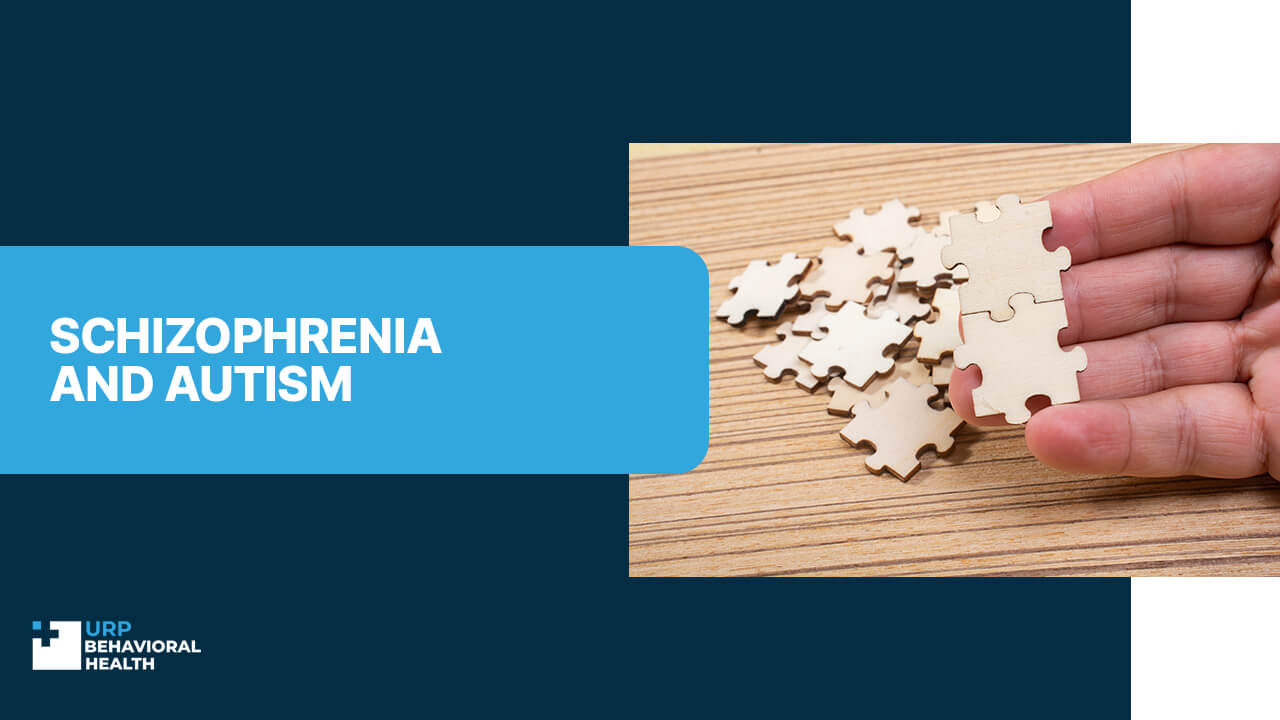
Schizophrenia and Autism
The identification and treatment of autism and schizophrenia connections are essential for improving diagnosis and treatment methods. Social interactions, communication, and behavior are significantly affected by both neurodevelopmental disorders, which are complex disorders that affect neurotransmitters. The relationship between these conditions and the conditions in question must be emphasized for clinicians and researchers to gain understanding of, as these conditions overlap throughout their respective conditions and associated networks.
Can You Have Autism and Schizophrenia?
Schizophrenia and autism may be linked, but it is not impossible to simultaneously exhibit both traits, despite the fact that the former may be a manifestation of both. Diagnosis and treatment may become complicated due to the potential for symptoms of one disorder to conceal or complicate symptoms of another. To care for affected individuals in the best possible way, it is essential to understand the interdependence of these conditions and their interdependence in a comprehensive manner. The way these two conditions are diagnosed can impact the presentation and progression of other conditions, making it essential to consider both diagnoses in treatment plans [1][2].
What is the Connection Between Autism and Schizophrenia?
The connection between autism and schizophrenia lies in their shared neurodevelopmental origins. Early developmental difficulties may be a contributing factor to both conditions, which researchers have found to share some genetic risk factors with both. The extent of their relationship is still a topic of study, and further research is necessary to determine their precise nature. Common genetic and environmental factors often trigger distinct brain changes that vary with a developmental period and can result in distinct effects on both the flora and physiology of the brain.[2].
Don’t wait - confidential help is available right now for you or your loved one.
Differences Between Autism and Schizophrenia
Autism and schizophrenia have some similarities, but also significant differences, particularly in the perception and treatment of these disorders. The most frequently diagnosed form of autism (ASD) is often seen as early as childhood, when it is most often diagnosed as socially inefficient individuals who are socially inefficient for some time and repetitively do repetitive activities. Schizophrenia is a disorder that typically emerges in late adolescentescence or early adulthood and is marked by symptoms such as delusions, hallucinations, and disorganized thinking. Accurate diagnosis and treatment require a spectrum of differences that is necessary for these differences. Autism often involves consistent patterns of behavior from early childhood, while schizophrenia might present after a period of normal development [1].
What are the Symptoms of Autism and Schizophrenia?
Autism is a term used to describe a variety of socially challenging, repetitive, and socially problematic behaviors, frequently accompanied by sensory experiences and focused/focused interests, and also a spectrum of other social sensitivities. Individuals undergoing the transition to schizophrenia may experience hallucinations, delusions, trance-like behavior, and negative symptoms like apathy and social withdrawal. Identifying and managing the various symptoms can aid in the diagnosis and treatment of any symptoms that are not commonly experienced While some overlap exists, such as social withdrawal, the underlying causes differ significantly between the two conditions. [2]. [2].
Diagnosis
Diagnosing autism and schizophrenia involves comprehensive assessments by healthcare professionals. For autism, diagnosis typically includes developmental screenings and behavioral evaluations. Clinical interviews, medical history reviews, and sometimes brain imaging studies are used to identify Schizophrenia diagnosis through the use of clinical interviews and medical history reviews. Detailed diagnosis is necessary for the development of personalized treatment plans that address specific patient characteristics. While the diagnostic criteria for each condition are well-established, the presence of both conditions can complicate the process of diagnosis, necessitating complete examination of the full clinical picture. [1][2].
Treatments
Autism and schizophrenia are often the result of multiple diagnoses, but treating these conditions with therapies that address each patient’s unique condition demands a multidisciplinary approach. Behavior, communication, and occupational therapies are often used for autism diagnosis and treatment. Schizophrenia treatment typically involves cognitive-behavioral therapy (CBT), social skills training, and support groups, along with CBT and CBT-CSS. Collaborative care plans that address individual patient and healthcare provider specific issues are possible through collaboration with healthcare professionals to create comprehensive care plans that tailor specific challenges to specific areas of concern. Regularly reviewing and updating these plans ensures they remain effective, adapting to progress and evolving needs for optimal management of both conditions. [1][2].
Risk Factors
Genetic predisposition, prenatal exposures, and early developmental challenges are among the risk factors for autism and schizophrenia. Family history of either condition can increase the risk. Environmental influences, such as maternal fecal deficiency during pregnancy and environmental exposure to toxins, may also play a role. Understanding these risk factors can aid in identifying and addressing potential risk factors before they occur. Early intervention programs targeting at-risk populations can potentially address these conditions and improve long-term outcomes by focusing on early intervention interventions in the populations targeted at risk. [1].
Reach out today and let us create a treatment plan designed around your needs.
Is it Possible to Prevent Someone with Autism from Developing Schizophrenia?
Autism patients often experience symptoms of schizophrenia, which can be exacerbated by complex interrelationships between autism and the immune system. Preventing schizophrenia early and with ongoing support can enhance outcomes and manage symptoms effectively, but early intervention is not a sure-cut. Research is continuously being conducted to gain a deeper understanding of the mechanisms underlying both conditions, including how preventative actions can be more effectively used to address them. Autism sufferers may be monitored for early symptoms of schizophrenia and proactively screened for symptoms with early intervention. [2].
Conclusion
Autism and schizophrenia are interrelated, and it is important to understand the connection between these disorders and their impact on individuals with autism. These conditions have some similarities, but specific characteristics necessitate individualized care. The quality of life may be affected by autism or schizophrenia if you or someone you know is struggling with these conditions; it’s critical to seek professional help. Autism and schizophrenia patients can undergo substantial improvements in their symptoms and quality of life with appropriate care and support. To enhance the well-being of individuals affected by these conditions, research and awareness work together through further studies and knowledge to improve outcomes. [1][2].
Additionally, acknowledging the potential inconsistency between autism and schizophrenia can help reduce stigma and promote comprehension in society, especially when children are unable to identify symptoms independently. People with these conditions rely heavily on their families and caregivers, who provide them with education and support, as well as resources. The capacity of community support organizations, such as educational programs, peer support groups, and advocacy organizations, is essential in creating an environment where individuals with autism and schizophrenia can thrive and flourish.
Integrating mental health services into primary care can enhance outcomes by enabling early detection and intervention. Collaboration among healthcare providers, educators, and social services is essential to creating comprehensive care plans tailored to the unique needs of individuals with autism and schizophrenia. By adopting a holistic approach that addresses physical, mental, and emotional well-being, we can improve treatment effectiveness and overall support for these conditions.
The distinct attributes and potentialities of individuals with autism and schizophrenia should also be taken into account. Autism and similar groups of Autismadvantageous individuals often exhibit exceptional abilities and talents in areas such as math, music, or art, with a considerable number of individuals having remarkable abilities and talents in these areas. schizophrenia patients may have lifelong successful individuals who can make a significant impact in society with the right support and opportunities. If we concentrate on valuing someone more than they need to worry about their issues, our community will be more supportive and inclusive.
In conclusion, autism and schizophrenia are distinct conditions, each with its own challenges, but understanding their connection can lead to better care and support for those affected. Continued research, greater awareness, and a focus on personalized, holistic care are essential for improving outcomes and enhancing the lives of individuals living with these conditions. If you or someone you know is experiencing symptoms, reaching out to a professional is a vital step toward effective management and a better quality of life. [1][2].
Our team will verify your insurance and design a plan tailored to your needs.
Sources
- [1] “Autism Spectrum Disorder”. https://www.nimh.nih.gov/health/publications/autism-spectrum-disorder
- [2] “The overlapping neurobiology of autism and schizophrenia”. https://www.sciencedirect.com/science/article/abs/pii/S0149763415001165
















